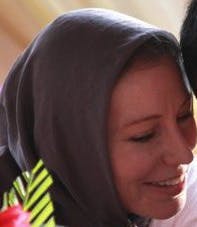Web 2.0: The New Tools of Democracy
Jan 21, 2015
Story
Turn on the computer and the evidence is clear: Web 2.0 in the hands of the people is revolutionizing the way we communicate, and the way we communicate is revolutionizing the world.
No longer can dictators or criminals commit atrocities and keep their deeds hidden, nor can they deny their crimes when the tools of new media allow us to be the eyes, ears , voice and conscience of our communities. With this new technology we become witnesses, citizen journalists and active participants in what is truly an international, borderless democracy.
Neda Agha-Soltan was a young woman shot and killed during the Iranian election protests in 2009. As she collapsed and died on the ground, witnesses with mobile phones recorded the event. The video evidence of Neda's death spread quickly around the world, making her an icon in the struggle for democracy in Iran.
At first Iranian authorities had kept silent about Neda’s killing, and when the evidence finally forced them acknowledge it, they tried to blame the West for her death. Yet, supported by a world of witnesses to the crime against his daughter, Neda’s father was able to openly declare that “no one, apart from the government, killed Neda. Her killer can only be from the government.\"
This is true democracy in action. It is currently breaking down the walls of silence throughout the Muslim world, and among the women who live in it. With Web 2.0 more people know about Tawakul Karman, a Yemeni activist leading the call for President Ali Abdullah Saleh to step down. Recently, when the president suggested protesters were violating Islamic law because women were mixing with men, thousands of women marched against him in protest.
Democracy extends to our personal freedoms. I’m from Canada, known to be one of the world’s most stable countries. However, as a result of free trade policies and cutbacks to social welfare, as a young mother I fell through the cracks of the system. I ended up in a low-income housing project struggling to care for my daughter’s needs, working several low-paying jobs to pay the bills, and putting myself through school. I often wrote about my struggles with poverty, but these were private thoughts hidden in journals.
Now, with this new technology, I am no longer alone. My daughter is grown, and I have found the power and freedom to use my writing and the tools of Web 2.0 to effect real change, particularly in my adopted country of Indonesia, a fledgling Muslim-majority democracy. I want so much for my writing to mean something, to help people, and to erase the borders between us.
Web 2.0 has leveled the playing field so that everyone, no matter what our age, race, religion, gender, country or financial condition, has a chance to participate in the world. With these tools we truly have freedom of speech, the freedom to gather and share information, and the freedom to tell our stories and expose injustice. Neda, whose name in Persian means “voice,” reminds us that each of us is still blessed with a voice to speak, eyes to see, ears to hear, and the heart to help those who need us.




